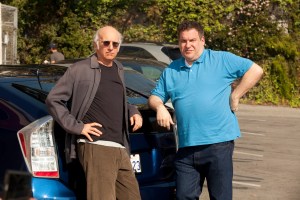
HBO
Last night’s episode of Curb Your Enthusiasm, “The Palestinian Chicken,” examined the Israeli-Palestinian conflict through the lens of chicken (if one ignores that a chicken lens would be opaque unless sliced very thin). I wouldn’t say it was as polarizing as the Mideast situation itself, but it at least has generated some hot discussion at The AV Club as to whether it merited the A+ rating reviewer Meredith Blake gave it.
I wouldn’t rank it as an all-time great, though I agree with Blake in liking the idea of the episode: the Philip Rothian concept of a protagonist who holds his Jewishness at a distance and ends up turned on by the idea of rebelling against it, here by eating at a Palestinian restaurant and getting it on with the bird shack’s hot, virulently anti-Israel owner.
Directly comparing Curb to Roth, though, probably does both a disservice. Roth’s protagonists have a complicated relationship to their Jewish background, but they also feel its pull–and its guilt–deeply enough to be affected by it. Whereas “social assassin” Larry David, the character, genuinely seems not to need to identify with his religion (as a religion, as opposed to as a source of food and comedy) just as he doesn’t feel a strong pull to any handed-down group identification. Larry just believes in pleasure and justice; he wants to eat his chicken and smite the “LOL”ers and overloud sippers of the world, and why should any ancient belief system get in the way of that?
In an argument that ends up mirroring the “Ground Zero mosque” debate as well as the West Bank conflict, both sides end up getting drawn very broadly–the cartoonish obviousness of the divide was for me a weak spot of a very, very funny episode. But by turning the pro- and anti-chicken forces into caricatures, David is able to make the episode less about politics and more about his favorite subject: the essential baseness of human nature. In Curb’s worldview, everyone is obnoxious, self-interested and a little hypocritical, and that makes for some great setups (such as the near-hypnotic spell that the forbidden chicken places on the rabbi Larry goes to consult with).
In the end, the quasi-trayf chicken becomes a kind of opposite metaphor to the black-and-white cookie of racial harmony (“Look to the cookie!”) from Seinfeld. Do you want to see why people are doomed to squabble and manufacture petty grievances in a world abundant with deliciousness? Look to the chicken!


